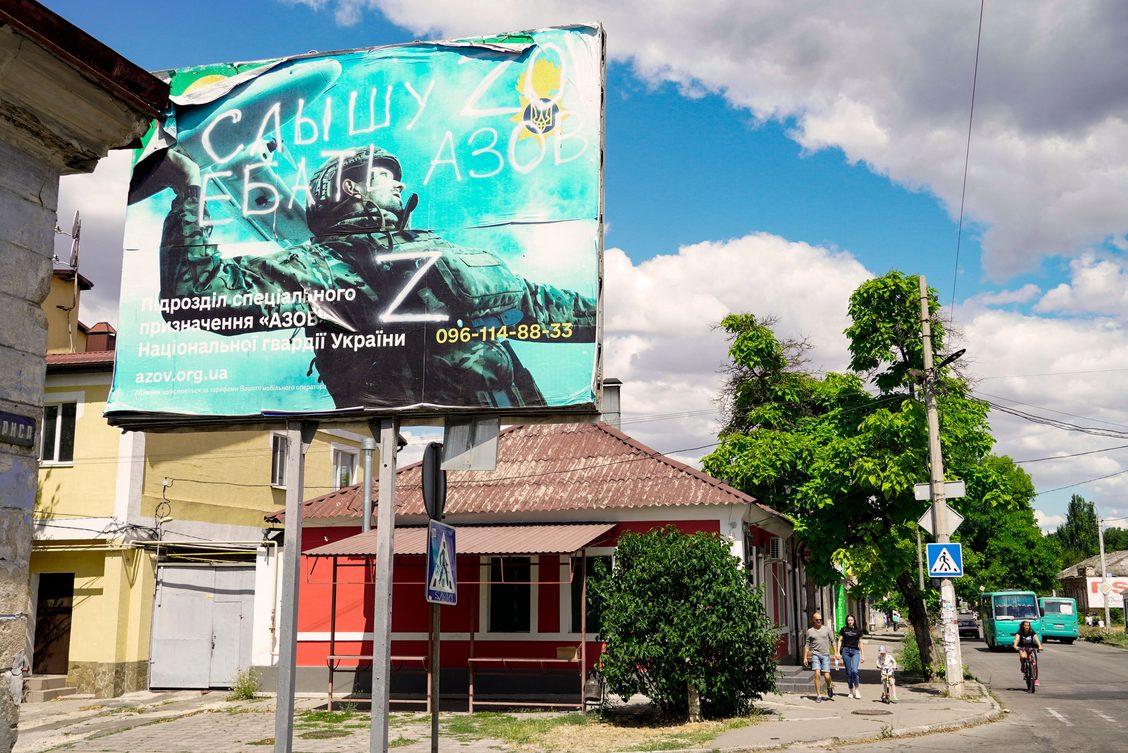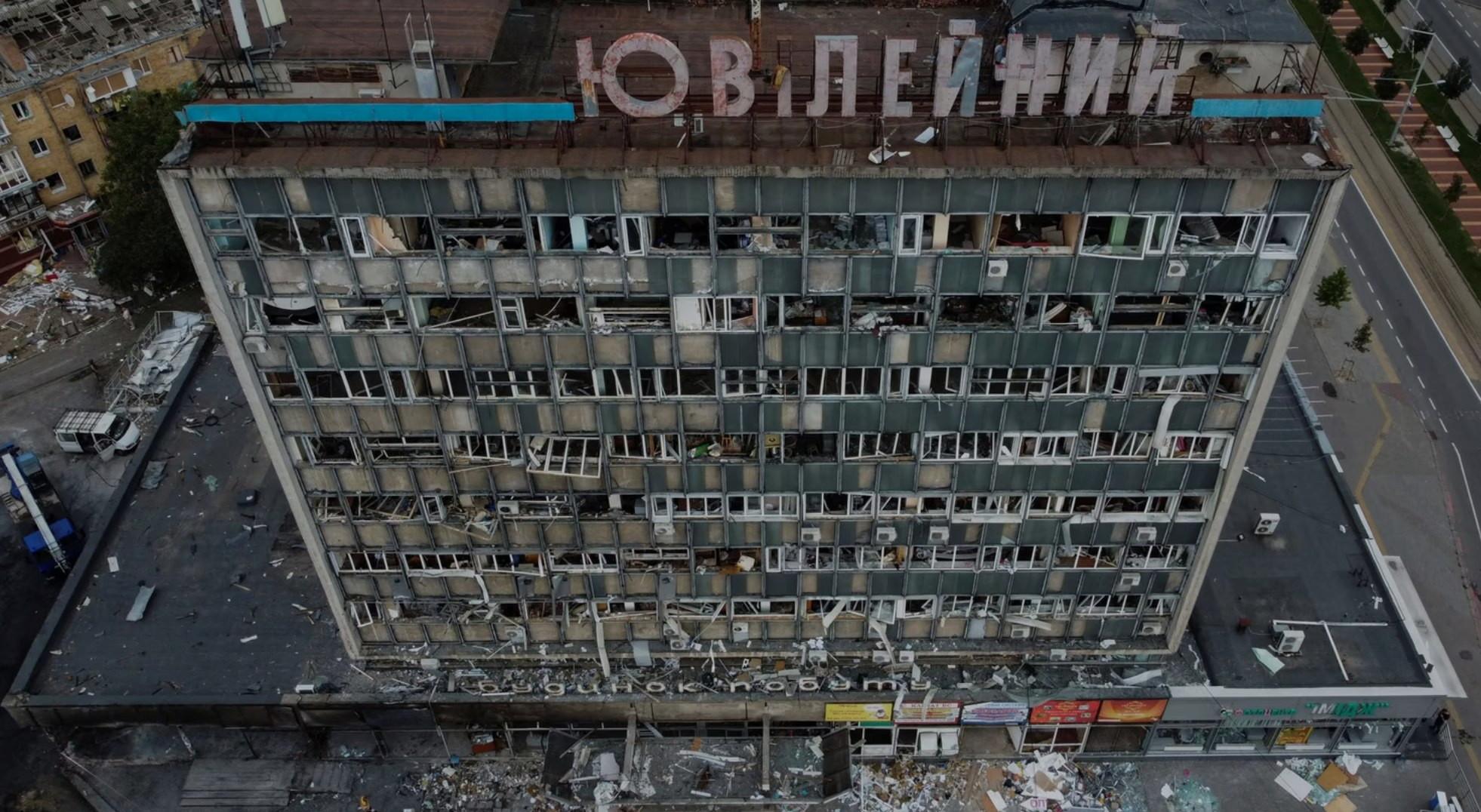Ukraine Daily
Friday, July 29
Want to get the news faster? Follow our website: kyivindependent.com.
Russia’s war against Ukraine

People walk along a street behind a promotional billboard of Ukraine’s Azov regiment, a former battalion turned National Guard unit, painted over with the letter Z, which has become a symbol of support for Russian military action in Ukraine, in the city of Kherson on July 19, 2022. (via Getty Images)
Dear readers, we recently launched a new newsletter, Belarus Weekly. To receive the Belarus Weekly newsletter in the future, subscribe via this link.
Zelensky: ‘No one in the world invests in terrorism more than Russia.’ President Volodymyr Zelensky, in an address to the nation, thanked the U.S. senators who unanimously approved the resolution calling on the U.S. State Department to designate Russia as a state sponsor of terrorism. “You can take any day in Ukraine — today or any other after February 24 — to see that no one in the world invests in terrorism more than Russia,” he said. “This really needs a legal response at the global level.”
Ukrainian embassy: Ship with stolen Ukrainian grain docks in Lebanon. Ukraine’s Ambassador to Lebanon Ihor Ostash met with Lebanon’s President Michel Aoun on July 28 to discuss the export of Ukrainian wheat to the Lebanese market. The ambassador also informed him that on July 27, a Syrian ship loaded with barley stolen from the occupied territories entered a port of Tripoli and asked to take measures. Ostash said that purchasing stolen Ukrainian goods would “harm bilateral ties” between Kyiv and Beirut.
Governor: 26 people injured by Russian missile strike on Kropyvnytsky. According to Kirovohrad Oblast Governor Andrii Raikovych, Russia hit the city with Kalibr missiles on July 28, killing five people. Among those injured, one person is in critical condition.
Parliament passes changes to legislation on exchange of POWs. According to lawmaker Yaroslav Zhelezniak, the changes were adopted during a parliamentary session on July 28. They imply that prisoners can be released from serving their sentences after being convicted if an authorized body decides to exchange them as a prisoner of war. If the exchange does not happen, the court sends the person back to prison to continue to serve the sentence.
Russian strike hits Kharkiv downtown. Kharkiv Mayor Ihor Terekhov reported that Russian forces hit a two-story house and a university at 4:09 a.m. on July 29. The State Emergency Service is working on the scene. There is no information on casualties at the moment.
Ukrainian troops arrive in Poland for treatment. The second group of 29 wounded Ukrainian soldiers came to Poland to be treated in the Krakow and Katowice hospitals. Previously, Poland accepted 31 wounded soldiers to hospitals in Lublin, Warsaw, Otwock and Lodz. Voivode of the Silesian Voivodeship Jaroslaw Wieczorek said that the treatment and rehabilitation of Ukrainian soldiers is “another brick of support” for Ukraine by Polish citizens in the face of Russian aggression.
Institute for the Study of War: Russian forces pressure Ukrainian civilians in occupied areas to use Russian rubles, attend Russian-run schools. The U.S. think tank reported on July 28 that Russia tries to combat Ukrainian resistance in occupied territories by forcing civilians to use Russian currency and passports, “setting conditions for longer-term social control.” The experts suggested that Kremlin might also try introducing a cashless economy in occupied areas to track money. The ISW also reported that the Russian military might be preparing for renewed offensive operations toward Kharkiv.
Parliament adopts law on special status of Poles in Ukraine. Ukraine’s Verkhovna Rada passed a law establishing legal and social guarantees for Polish citizens residing in Ukraine on July 28, European Pravda reports. As part of the law, Polish citizens will be able to stay in Ukraine for 18 months and have access to the same work, educational, and health care rights as Ukrainians. The law still has to be signed by the speaker of the Verkhovna Rada and the president before taking effect.
$1 billion in assets of Russian, Belarusian companies seized in Ukraine. In the five months of Russia’s full-scale invasion, courts in Ukraine have seized the assets of Russian and Belarusian companies worth Hr 39.5 billion ($1 billion), the press service of the Department of Strategic Investigations of the National Police reported. Law enforcement officers also seized vehicles worth Hr 1.3 billion ($35 million), which are currently being used by Ukraine’s Armed Forces.
Read and listen to our exclusives
Ukraine’s state-owned oil and gas company Naftogaz defaulted on a portion of its debt on July 26 after a government decision caused it to miss the deadline for Eurobond payments. Read our explainer on what happened to Naftogaz.
Russian tanks rolled into Kherson, a regional capital in southern Ukraine, as well as neighboring towns and villages, from occupied Crimea in early March, about a week after the start of Russia’s full-scale invasion on Feb. 24. Amid occupation, Kherson’s resistance continues through boycott and guerrilla operations.
Russia’s war has made Ukraine one of the most mine-contaminated countries in the world. In this new episode of our podcast “Did the War End?” we are joined by an expert to take a closer look at what would it take to demine Ukraine.
In his native Belarus, 30-year-old tech entrepreneur Andrey Poznyak was once a political prisoner. He spent six months behind bars for protesting Belarusian dictator Alexander Lukashenko’s brutal crackdown on civil society following fraudulent elections in 2020. Poznyak later made his way to Ukraine, along with thousands of fellow techies, and in the fall of 2021 founded a startup called Peech. Read our story on how Peech attracts half a million dollars from Ukrainian investors.
The human cost of Russia’s war
Ukrainian poet killed on front lines. Hlib Babich, a soldier, poet and songwriter, has died defending Ukraine. His death was reported on July 28 by Serhii Bratchuk, a spokesman for Odesa Oblast’s military administration.
Russian shelling kills policeman in Kharkiv Oblast. 26-year-old police sergeant Oleksiy Nasonov died as a result of Russian shelling of a thermal power plant in Kharkiv Oblast, said the Kharkiv Oblast Police Department. Mayor of Kharkiv, Ihor Terekhov, said Russians shelled the city twice overnight on July 28 with S-300 missiles.
Russian attacks kill at least 3 people, injure 3 in Bakhmut, Donetsk Oblast. According to Donetsk Oblast Governor Pavlo Kyrylenko, Russian troops shelled the city four times on July 28. A total of 12 residential buildings were damaged as a result of the attacks. “Every day, Russians commit new war crimes in Donetsk Oblast,” Kyrylenko said.
Russian missile strikes kill 5, injure 25 in Kropyvnytsky, Kirovohrad Oblast. According to Kirovohrad Oblast Governor Andrii Raikovych, two Russian missiles hit the city around noon on July 28. The type of missiles has not been determined yet.
Russian shelling of Kherson Oblast kills 7, injures 6 over past 24 hours. Kherson Oblast police said that Russian attacks also damaged and destroyed houses in four settlements. In addition, Russian forces stole civilians’ vehicles and a passenger ship, which they reportedly use to cross the Dnipro River in the area of the damaged Antonivsky bridge. Kherson Oblast police reported that they opened 17 criminal proceedings regarding war crimes committed by the Russian army against the civilian population of Kherson Oblast over the past day.
US official: Over 75,000 Russian soldiers have been killed or injured since Feb. 24. After attending a classified briefing, congresswoman Elissa Slotkin told CNN that the U.S. estimates that more than 75,000 Russian soldiers have been killed or wounded since the beginning of Russia’s all-out war against Ukraine. “Over 80% of their land forces are bogged down, and they’re tired,” Slotkin added.
International response
G7 ambassadors ‘welcome appointment’ of Ukraine’s new anti-corruption prosecutor. “This is a leap forward in making Ukraine’s anti-corruption architecture fit for purpose,” reads the statement by G7 ambassadors to Ukraine. “Now Ukraine has to make sure SAPO has all the resources and institutional independence it needs to tackle high-level corruption.” Oleksandr Klymenko, 35, was appointed as the head of the Specialized Anti-Corruption Prosecutor’s Office on July 28. The post was unoccupied for two years.
EU will more than double electricity imports from Ukraine. Starting July 30, the ENTSO-E association, which represents the EU electricity transmission operators, allowed a 2.5-fold increase in the export of Ukrainian electricity, or 250 megawatts, to European countries. “The EU is aware of the role of Ukrainian electricity, which helps in replacing Russia’s toxic gas,” said Volodymyr Kudrytskyi, the head of the board of state-owned electricity grid operator Ukrenergo.
Latvia approves further military support to Ukraine. According to Latvian Defense Minister Artis Pabriks, a closed meeting of the government was convened on July 28 during which a Defense Ministry proposal to provide additional military support to Ukraine was approved, reported Delfi. The ministry did not announce the details of the aid. Latvia has already provided more than 200 million euros in military support to Ukraine, providing weapons, equipment, ammunition, anti-tank weapons, and Stinger anti-aircraft missiles.
US official: There is bipartisan support to send long-range missiles to Ukraine. Congresswoman Elissa Slotkin, who serves on the House Armed Services Committee, told CNN that there is bipartisan support for supplying Ukraine with ATACMS, missiles that can strike as far as 280 kilometers. Ukraine has been asking U.S. for such weapons for months. “Ukrainians want to go to the south and do operations in the south. And we want them to be as successful as possible,” Slotkin said.
Balenciaga designs shirt to raise money for Ukraine. The brand announced on July 28 that it joined United24, a platform launched by President Volodymyr Zelensky for charitable donations in support of Ukraine, as the country is battling Russia’s war. Balenciaga announced a shirt featuring prints of the Ukrainian flag and a tryzub (trident), Ukraine’s coat of arms. 100% of the net profits from the shirt’s sales, which costs 200 euros, will be donated to humanitarian efforts to rebuild Ukraine, the brand said.
Want to get the news faster? Follow our website: kyivindependent.com.
Today’s Ukraine Daily was brought to you by Alisa Soboleva, Daria Shulzhenko, Oleg Sukhov, Toma Istomina, Natalia Datskevych, Lili Bivings, Olena Goncharova, Brad LaFoy, and Anastasiya Gordiychuk.
If you’re enjoying this newsletter, consider becoming our patron on Patreon or donating via GoFundMe. Start supporting independent journalism today.



Comments
No comments yet. Be the first to react!